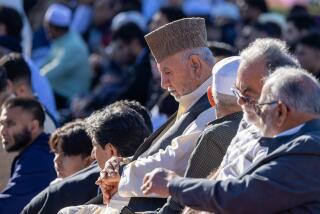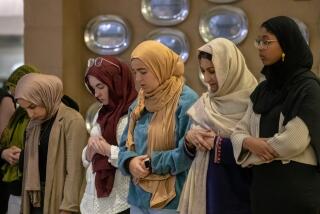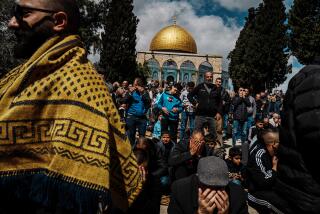Reflecting on Freedom
- Share via
This week, a White House conducting war against terrorists hosted Ramadan feasts, albeit with closely scrutinized guest lists. In Afghanistan, freshly unveiled women revealed faces that might be seen in the neighborhoods of Los Angeles or New York. Around the nation, Muslims reached out to other Americans, amid justifiable alarm about stereotyping by the FBI and abridgements of civil liberties.
Those are some of the images of Ramadan this year, a month of reflection and fasting for Muslims that has usually gone little noticed in the United States. This Ramadan has special meaning not just for the Muslims who observe it but also for a broader group of Americans who should be reminded of the beneficial influence of their own country’s ideals.
Someone who knows about democracy’s special impact on religious practice is Shabbir Mansuri, toiling in a small Fountain Valley office with the help of foundations to promote understanding of Islam in American textbooks. Ramadan this year has prompted him to think again about the meaning of freedom and the uniqueness of the 1st Amendment.
He says that because Muslims believe in a Day of Judgment, a critical part of being Muslim is accountability for one’s actions. But accountability implies freedom to do right or wrong, rather than simply being told what to do by a repressive government. Because the United States has a Bill of Rights that encourages Americans to speak and act freely, it provides a political framework where religion can flourish.
Three years ago, nine Muslim scholars visited Mansuri from Saudia Arabia, Syria, Jordan, Egypt and other countries, and they told him that the United States was the place where Islam could be practiced as intended.
The United States sometimes falls short of its ideals, but it’s much more a Promised Land than a Great Satan. Anti-U.S. rhetoric now echoes through many of those very countries the scholars came from. The separation of church and state in the Bill of Rights turns on two key clauses, one prohibiting the official establishment of religion and the other guaranteeing its free exercise. The establishment clause has been the focus of court cases about the separation of church and state, but the experience of Muslims draws renewed attention to the free-exercise clause as a beacon to the world. An angry Muslim world should take notice.
Freedom of religion and freedom of expression make it easier to see and condemn the self-serving hypocrisy of Al Qaeda, the Taliban and others claiming to act in the name of God. In the Bill of Rights, the hatemongers have met their match. Because of this, law enforcement must be sure that other U.S. constitutional protections are preserved.
This Ramadan season makes it clear that not only does religion strengthen democracy but democracy strengthens religion. The post-Sept. 11 period shows how important the relationship is between the two. We are reminded of this at key moments in U.S. history, such as when the Bill of Rights was adopted and when waves of immigration brought Islam, Buddhism and other world religions into the Judeo-Christian mix of the United States.
More to Read
Sign up for Essential California
The most important California stories and recommendations in your inbox every morning.
You may occasionally receive promotional content from the Los Angeles Times.













